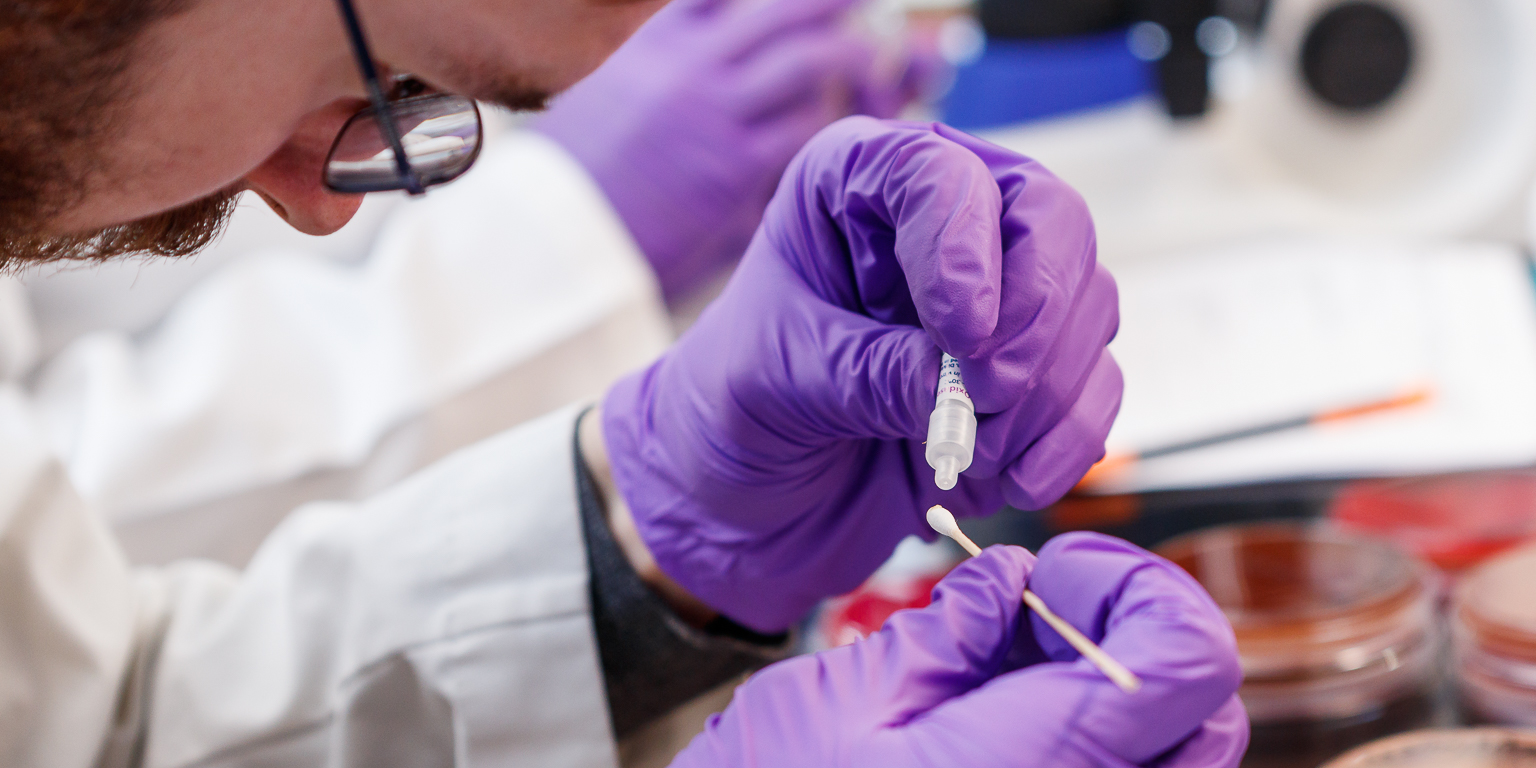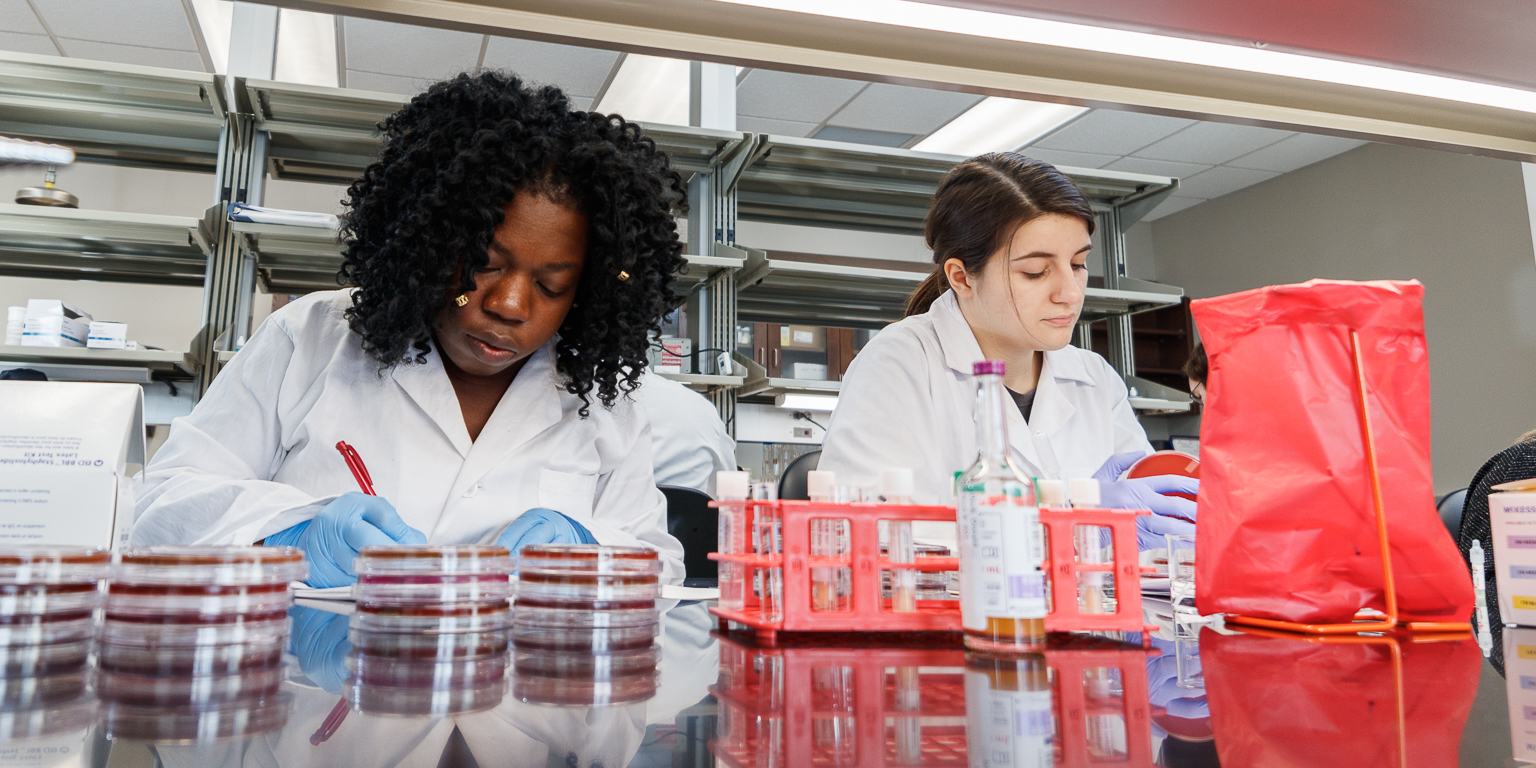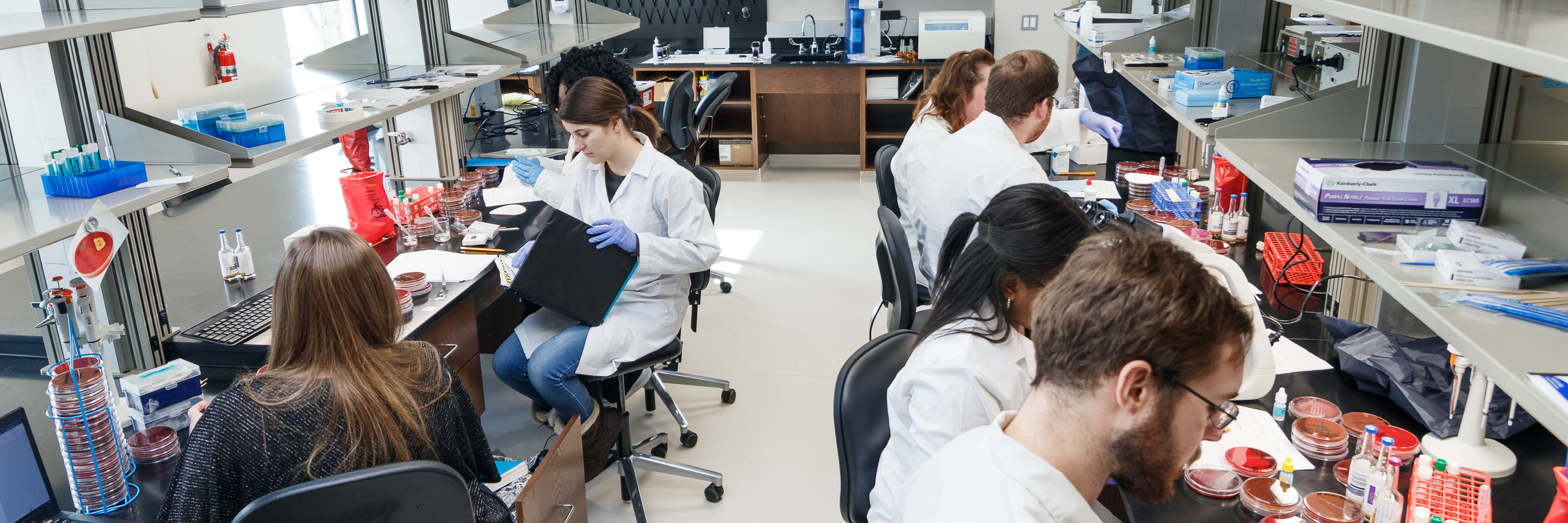Contact Us
Don’t wait! Register in the fall semester for entry into the professional curriculum in the following spring.
The Profession

The Medical Laboratory Scientist (MLS) professional, also known as a Clinical Laboratory Scientist, is an integral member of the patient care team who provides diagnostic information required to identify and treat the cause of illness in patients.
Formerly known as a Medical Technologist, the MLS has an aptitude for science, especially biology and chemistry, and appreciates the investigative and technical aspects of laboratory medicine. Laboratory professionals are devoted to detection and diagnosis through the analysis of blood, body fluids, and tissue. An MLS will perform hundreds of laboratory tests, for which the results are used by physicians to diagnose disease, identify the most appropriate medication and dosage, and monitor the response to treatment.
In a laboratory, a Medical Laboratory Scientist may work in a variety of areas including the following:
In clinical chemistry, tests are often performed on blood and other body fluids to determine the patient’s levels of various enzymes, proteins, and hormones. Variation in these analytes is diagnostic of disease such as diabetes, cardiac abnormalities, and even organ failure.
In hematology, blood is examined for indicators of inflammation and infection, as well as cancers such as lymphoma and leukemia. Blood is also tested for its ability or inability to clot appropriately. This is referred to as hemostasis.
Diagnostic testing in immunology is often centered on infectious diseases, through the identification of the infecting agent or antibodies produced in the presence of such agent. The antibodies involved in autoimmune diseases, such as lupus and arthritis, are also identified in immunology.
In microbiology, body fluids, tissues, and other biological specimens are examined and tested to identify microorganisms causing disease and determine effective treatment options. Microbiology testing examines bacterial, viral, fungal, and parasitic agents causing disease in humans.
The blood bank may be one of the most critical areas for the health of a patient. Not only does the blood bank perform simple tests, such as determining a patient’s blood type, the blood bank is also responsible for transfusion medicine, ensuring blood given to a patient is compatible and will not cause harm.
The Program

The Bachelor of Science in Medical Laboratory Science (MLS) program is not admitting new students in the spring of 2026 and beyond. Those already enrolled in these degree programs will be able to complete their degrees as planned. The MLS program prepares students for work in the diagnostic laboratory setting including hematology, immunology, microbiology, chemistry, phlebotomy, molecular diagnostics and blood bank. The MLS program is located in the Dwyer Hall, which houses a classroom, student laboratory, lounge area, break room, and a wellness room. Students who graduate from this NAACLS (National Accrediting Agency for Clinical Laboratory Sciences) accredited program are eligible to sit for the American Society of Clinical Pathology Board of Certification (ASCP BOC) exam.
| Class of 2023 | Class of 2024 | Class of 2025 |
Graduation Outcomes | |||
# students enrolled in second half of program | 8 | 5 | 4 |
# students graduated | 8 | 5 | 4 |
Graduation rate | 100% | 100% | 100% |
Board Exam Outcomes | |||
# students who attempted exam within one year of graduation | 7 | 3 | 3 |
# students who passed exam within one year of graduation | 5 | 3 | 1 |
Program board exam pass rate | 71% | 100% | 33% |
National board exam pass rate (1st attempt, NAACLS program) | 78% | 79% | 79% |
Employment Outcomes | |||
# students who found employment | 8 | 5 | 4 |
Employment placement rate for students with known outcomes | 100% | 100% | 100% |
# students who continued education | 0 | 1 | 0 |
# students who did not find employment | 0 | 0 | 0 |
# students with unknown outcomes | 0 | 0 | 0 |
NOTE: 2025 data collection in progress until May 6, 2026
Memorial Hospital 615 N. Michigan Street South Bend, IN 46601 Gina Arsenault, MS, MLS(ASCP) | St. Joseph Regional Medical Center 5215 Holy Cross Parkway Mishawaka, IN 46545 Susan Richeson, MJ, BSMT(ASCP) |
Elkhart General Hospital 600 East Boulevard Elkhart, IN 46514 Michelle BonDurant, MT(ASCP) SBBCM | St. Joseph Regional Medical Center 1915 Lake Avenue Plymouth, IN 46563 Susan Richeson, MJ, BSMT(ASCP) |
Community Hospital of Bremen 1020 High Road Bremen, IN 46506 Leah Powell, MT(AMT) | LabCorp 3575 Moreau Court South Bend, IN 46628 Lynette Smith, MS, MLS(ASCP) |
Beacon Medical Group 900 I Street La Porte, IN 46350 Cheryl Sacks, MLS(ASCP) | Logansport Memorial Hospital 1101 Michigan Avenue Logansport, IN 46947 Julee Looker, MLS(ASCP), CHTS-PW |
South Bend Medical Foundation 530 N. Lafayette Boulevard South Bend, IN 46601 Joyce Peterson-Miller, MT(ASCP) | Northwest Health – La Porte 1331 State Street La Porte, IN 46350 Jennifer Ulrich, MT(ASCP)CM |
Spectrum Lakeland Health 1234 Napier Avenue St. Joseph, MI 49085 Jamie Starbuck, MBA, BS, M(ASCP) | South Bend Clinic 1945 Lincolnway East South Bend, IN 46615 Everett Barker, BS, MT(ASCP) |
Dukes Memorial Hospital 275 W. 12th Street Peru, IN 46970 Jordan Phillips, HT(ASCP) | Woodlawn Hospital 1400 E 9th Street Rochester, IN 46975 Emily Schouten, MS, MLS(ASCP)CM |
Kosciusko Community Hospital 2101 E. Dubois Drive Warsaw, IN 46580 Pam Arvesen, BS, MT(ASCP) |
Students seeking admission to the Bachelor of Science in Medical Laboratory Science program should first apply and be accepted into Indiana University South Bend. The Bachelor of Science in Medical Laboratory Science (MLS) program is not admitting new students in the spring of 2026 and beyond. Those already enrolled in these degree programs will be able to complete their degrees as planned. Resources for applying to Indiana University South Bend may be found on the Admissions webpage. There are multiple routes in which a student may seek admission into the Bachelor of Science in Medical Laboratory Science program. The route taken is dependent on the academic experience of the applicant.
- This is your first bachelor's degree:
You are considered a traditional student if this is your first bachelor's degree. You may be enrolling at IU South Bend as a freshman, transferring from another institution, or have an associate's degree. You will enroll at IU South Bend as a pre-Medical Laboratory Science student, complete the required prerequisite courses, and apply for the professional program when ready. Student cohorts for the professional program begin every January (spring semester).
- You have a bachelor's degree:
You are considered a second degree student if you already have a bachelor's degree. If you degree is in biology, chemistry, or a related field, you might not need to take any prerequisite courses. If you degree is in another discipline, you may be required to take prerequisite courses before entering the Medical Laboratory Science program. You will enroll at IU South Bend as a pre-Medical Laboratory Science student and apply to the program. When your application is received, you will be notified by the program if you are required to take any prerequisite courses. Student cohorts for the professional program begin every January (spring semester).
- You are a Medical Laboratory Technician (MLT):
If you have an associate's degree as a Medical Laboratory Technician or hold credentials, you are eligible for the MLT to MLS Degree Completion program. This bridge program provides courses to bring you to the bachelor's level and support growth as a Medical Laboratory Scientist. This is a direct admission program that you may begin any semester.
- Institutional Fees
Students enrolled in the Bachelor of Science in Medical Laboratory Science degree program pay tuition rates established by Indiana University South Bend and reported on the Tuition and Fees website. The structure of the traditional Medical Laboratory Science curriculum allows students the opportunity to take advantage of the campus wide banded tuition established for undergraduate course credit hour fees. Students enrolled in the MLT to CLS degree completion track have the ability to utilize the banded tuition, if the minimum number of credit hours are taken.
Essential functions are the physical, intellectual, and behavioral requirements that a student must be able to demonstrate to successfully participate in the Bachelor of Science in Medical Laboratory Science program and become an effective employee. In compliance with the National Accrediting Agency for Clinical Laboratory Science (NAACLS), the essential functions for the Indiana University South Bend Medical Laboratory Science program are defined here.
• Visual and Perceptual Skills
A student in the Medical Laboratory Science program must possess sufficient visual skills to perform and interpret laboratory assays and receive non-verbal communication appropriately.
• Motor, Physical Ability, Coordination, and Dexterity Skills
A student in the Medical Laboratory Science program must possess adequate motor skills to perform a variety of laboratory assays.
• Intellectual and Critical Thinking Skills
A student in the Medical Laboratory Science program must possess a range of intellectual skills that allows for mastery of a broad and complex body of knowledge that constitutes a medical laboratory science education.
• Emotional Stability and Personal Temperament
A student in the Medical Laboratory Science program must possess sufficient emotional health to fully utilize intellectual ability, to exercise good judgment, to complete clinical responsibilities promptly, and to relate to patients, instructors, and colleagues with courtesy, and respect.
• Withdrawal from Courses
In any situation that a student wishes to withdrawal from courses, they must adhere to the Indiana University South Bend Withdrawal Requirements. Students are encouraged to speak with the Medical Laboratory Science Program Director prior to withdrawing from any courses.
• Academic Leave of Absence
Students who wish to take an extended academic leave of absence should speak with the Medical Laboratory Science Program Director before doing so. Taking an academic leave of absence will impact the student’s expected graduation date and may impact their ability to reenroll in the program courses upon returning.
• Notifications of Opportunities for Improvement
Students enrolled in the Bachelor of Science in Medical Laboratory Science program are followed academically by faculty. As students’ progress through courses and the curriculum, there may be opportunities for success that are identified. In these instances, the faculty will adhere to the Opportunities for Success Documentation Policy.
• Dismissal from the Medical Laboratory Science program
The dismissal of a student from the Medical Laboratory Science program will be initiated by the Program Director and reviewed by the School of Applied Health Sciences (SAHS) Council. The reason for dismissal from the program may be academic, behavioral, or regulatory. Students who wish to appeal a dismissal decision, they must submit the appeal request in writing to the Program Director and Assistant Dean of Student Success within five business days of notification of the decision, in accordance with DCHS policy AS-05-C. If a recommendation cannot be made, the student may appeal to the Dean of the College of Health Sciences.
•Reinstatement to the Medical Laboratory Science Program
Students seeking reinstatement to the Medical Laboratory Science program must follow requirements outlined in the Student Reinstatement to the Medical Laboratory Science Program policy.
Students may enter the program through multiple routes:
- As entering freshman or transfer students seeking their first bachelor's degree,
- As second degree students with a bachelor's degree in related fields.
- As a certified Medical Laboratory Technician seeking progression from an associate to bachelor degree. Also known as the Bridge program.
Available Routes of Degree Completion
Career Opportunities
The United States is experiencing a shortage of Medical Laboratory Scientists, who comprise the third largest group of healthcare professionals in the country. Certified Medical Laboratory Scientists may readily find employment throughout the United States in hospitals, medical and diagnostic laboratories, research laboratories, government laboratories, and within the healthcare industry. According to the U.S. Department of Labor, Bureau of Labor Statistics, employment of clinical laboratory professionals is expected to grow faster than average for all occupations through 2030. The average annual earnings in Indiana were $62,500 according to the 2021 ASCP Wage Survey.
Students who complete the Medical Laboratory Science program will be eligible to take the national certification board exam through the American Society for Clinical Pathology Board of Certification (ASCP BOC) as an entry level Medical Laboratory Scientist. ASCP certification allows employment in all US states except those that require additional state licensure and/or certification. ASCP certification is additionally recognized as a gold standard in the profession internationally.
Faculty and Staff
The faculty and staff of the Medical Laboratory Science program have a diverse background in biological and chemical sciences, laboratory medicine, laboratory management, and research. The faculty strive to give students the best education to become well-recognized clinical laboratory professionals.
Barbara Spinda, EdD, MLS(ASCP)CM SMCM
Dwyer Hall, 151
(574) 520-4568
bspinda@iu.edu
Kim Kibby, MSA, CIC, MLS(ASCP), SH, SCCM, SMCM, PBT(ASCP)
Dwyer Hall, 158
(574) 520-4601
kiskibby@iu.edu
Ann Freeze,
Education and Arts, 1250
(574) 520-4158
akfreeze@iu.edu
Accreditation
The Medical Laboratory Science Program at Indiana University South Bend is accredited by the National Accrediting Agency for Clinical Laboratory Sciences, 5600 N. River Rd, Suite 720, Rosemont, IL 60018, 847-939-3597, info@naacls.org.
National Accrediting Agency for Clinical Laboratory Sciences (NAACLS)
5600 N. River Rd.
Suite 720
Rosemont, IL 60018
Phone: 773-714-8880
Email: info@naacls.org
Website: naacls.org


